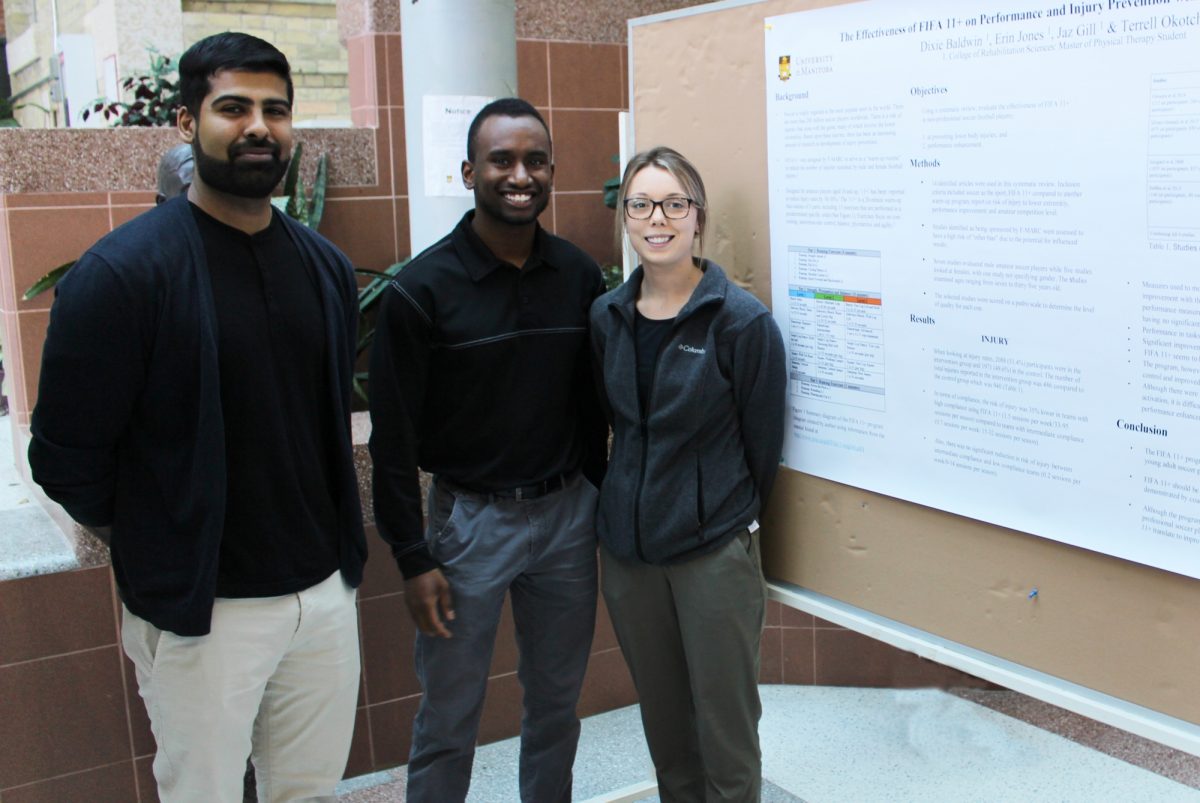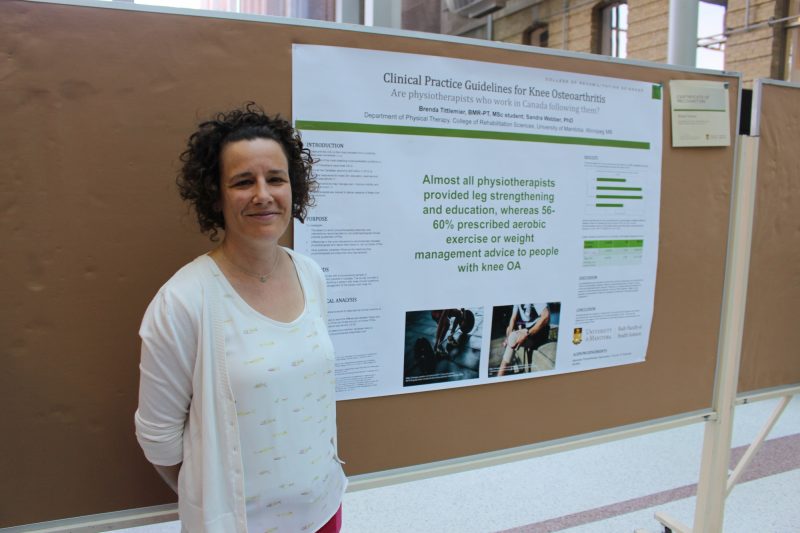
Jas Gill, Terrell Okotcha and Dixie Baldwin presented their research into the effectiveness of FIFA 11+, a fitness module created by the FIFA world soccer federation at the CoRS Student Research Symposium.
CoRS Student Research Symposium educates, inspires
Over 50 projects, with topics ranging from HIV stigmatization to the health effects of electronic cigarettes were covered at the College of Rehabilitation Sciences (CoRS) Student Research Symposium, June 19 at the Bannatyne campus.
The event was an expansion of the annual MOT Research Symposium, which showcases projects from students in the Master of Occupational Therapy program. This year it also included projects from other CoRS departments.
Dr. Barbara Shay, head of the physical therapy, said it was worth experimenting with an expanded format this year, as the students will be embarking on inter-professional careers.
“Some students said they were interested and happy to learn about their colleagues’ research, and that they were surprised how much their interests overlap,” Shay said. “But that’s what it’s all about, isn’t it? If we want inter-professional collaboration we need to model it in our education.”
The day opened with a keynote address by physical therapy assistant professor Dr. Patty Thille, who discussed the human side of the roles of caregivers. Occupational therapy student Andreea Alexandresu found Thille’s presentation inspiring and immediately relatable.
“She emphasized the importance of hearing patients’ stories and their experiences, which is also what we took away from our project,” she said.
Alexandresu and her team presented an interactive session on their community-based program people living with HIV, and the barriers they face in professional settings.
“Through our research and the experiences of our participants, we learned more about what a complex decision it is to disclose your HIV status, as well as the importance of sharing experiences and how empowering that can be for people living with a stigmatized illness,” Alexandresu said.
A poster from respiratory therapy student Hailey Graboweski looked at the implications of electronic cigarettes on a user’s cardiopulmonary health.
“Many people think electronic cigarettes are harm-free but they’re actually not,” she said. “They have many byproducts that are harmful on their own – chemicals, known carcinogens and even things like metals from the devices themselves.”
She said it remains unclear whether or not electronic cigarettes should be considered an effective tool for tobacco harm reduction. There does appear to be a potential for cardiopulmonary benefits, but longer studies are needed, she said.
“As with smoking, we know it takes time to build the negative effects and I think electronic cigarettes may be the same,” Graboweski said.
Physical therapy student Jas Gill was part of a team that examined the effectiveness of FIFA 11+, a fitness module created by the FIFA world soccer federation to reduce lower body injuries in male and female footballers.
“The two things we looked at were performance and injuries,” he said. “In terms of performance we didn’t find anything statistically significant, but we found that it does prevent injuries if people were to comply with it twice a week.”

M.Sc. Rehabilitation Sciences student Brenda Tittlemier said the event was a great opportunity for her to share her research into clinical practice guidelines.
M.Sc. Rehabilitation Sciences student Brenda Tittlemier presented a poster about whether physiotherapists in Canada were following clinical practice guidelines for knee osteoarthritis (OA), the most common form of arthritis in the knee.
Her research analyzed data from 388 respondents across Canada. She discovered nearly 100 per cent of physiotherapists provided leg strengthening exercise and education to their patients, whereas 60 per cent prescribed aerobic exercise and 56 per cent discussed weight-loss.
She said the event was a great chance to not only liaise with faculty, staff, researchers and students, but also clinicians and other health-care professionals.
“It was a great opportunity to talk about and share my research,” she said. “Disseminating your findings is an important step in the research process, and the chance to do that at an event such as this was a valuable opportunity.”






